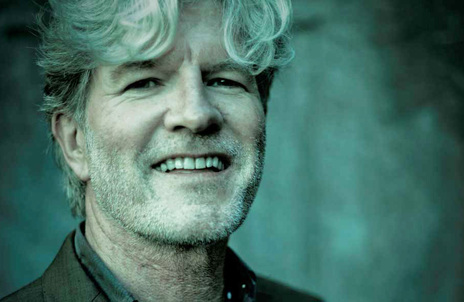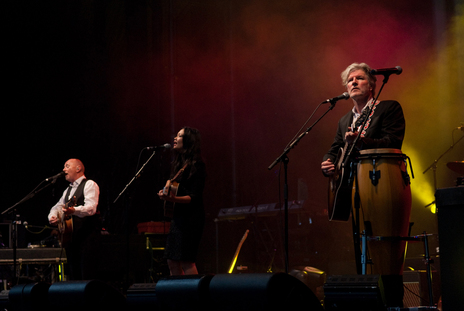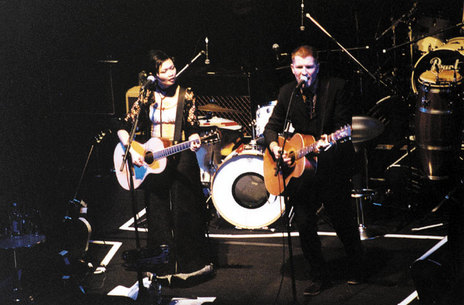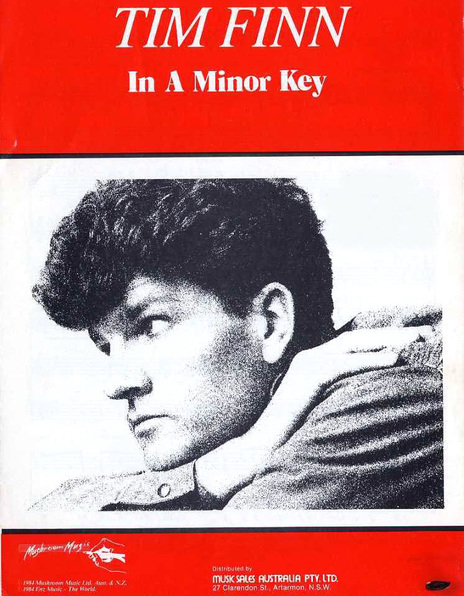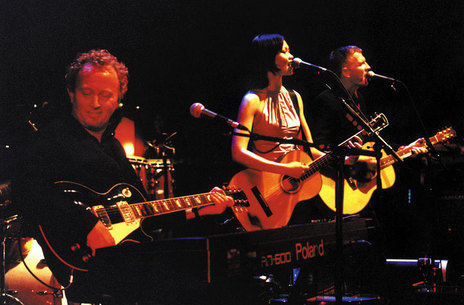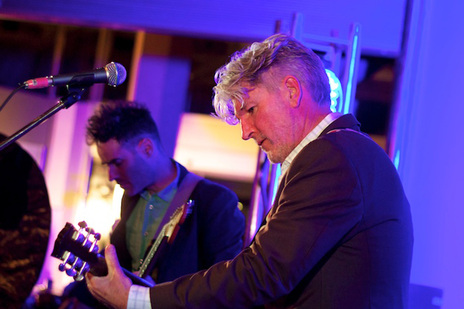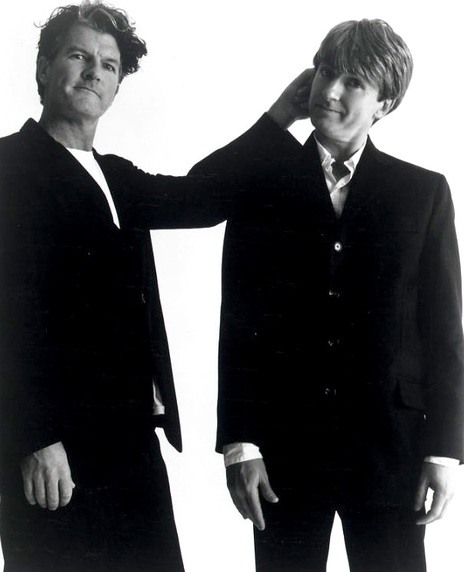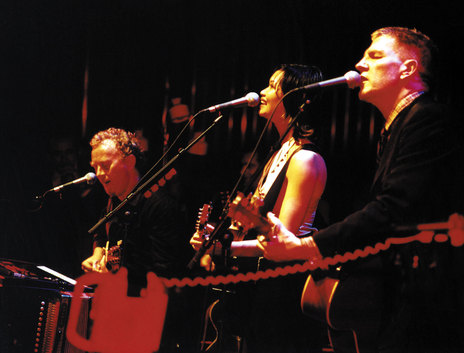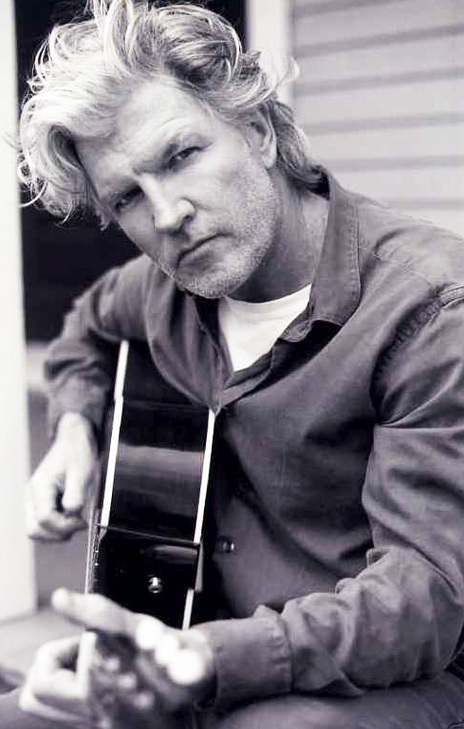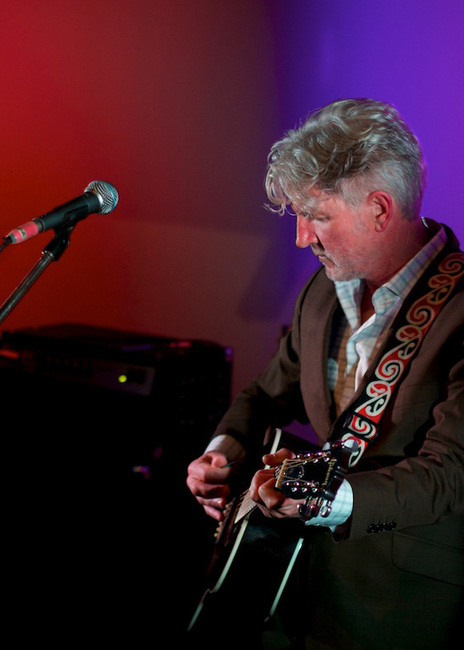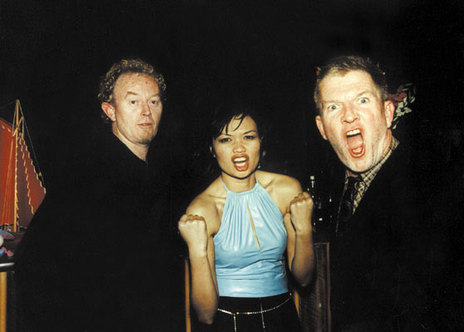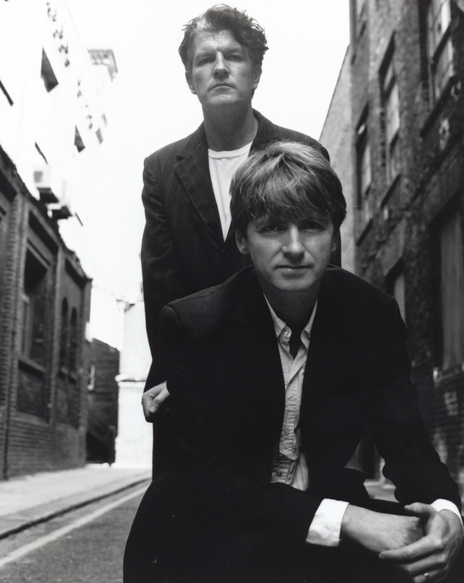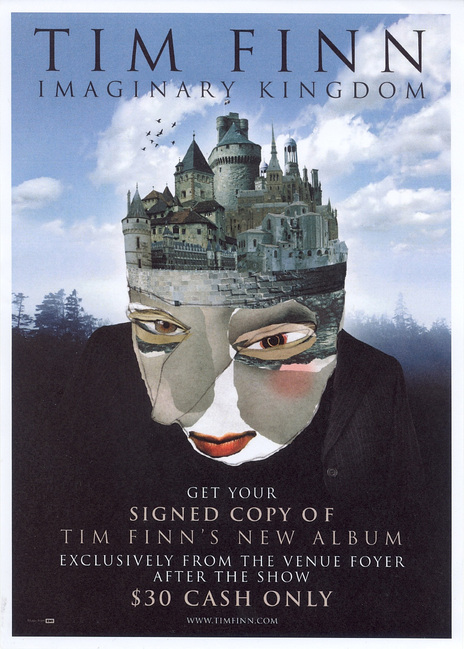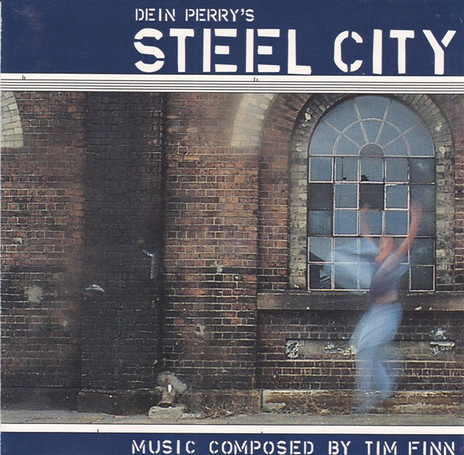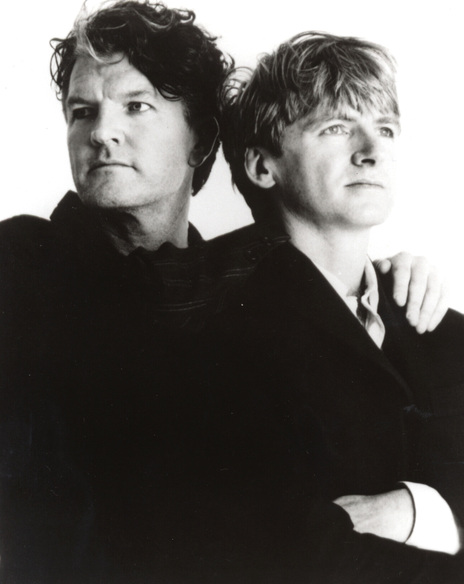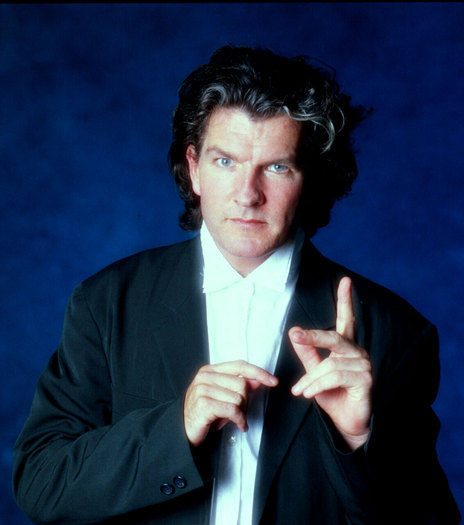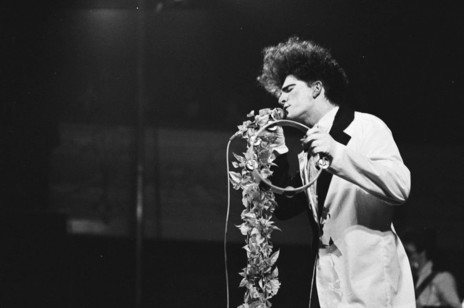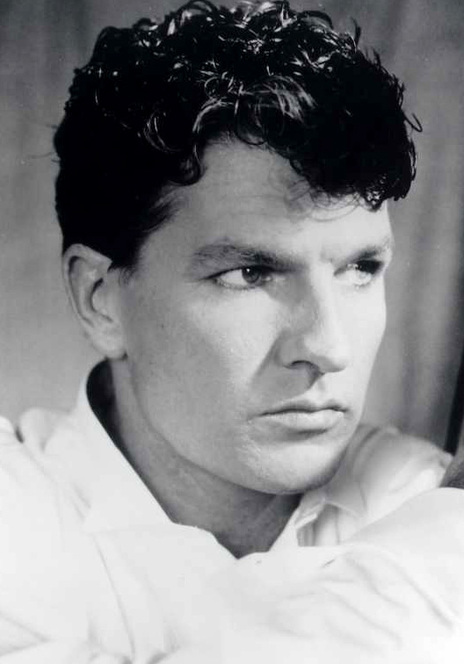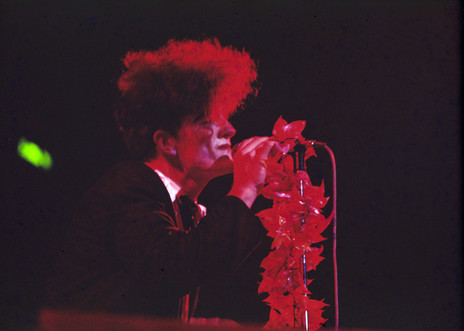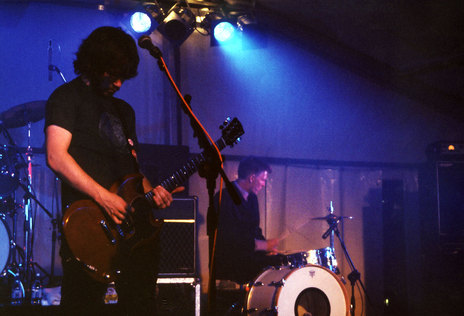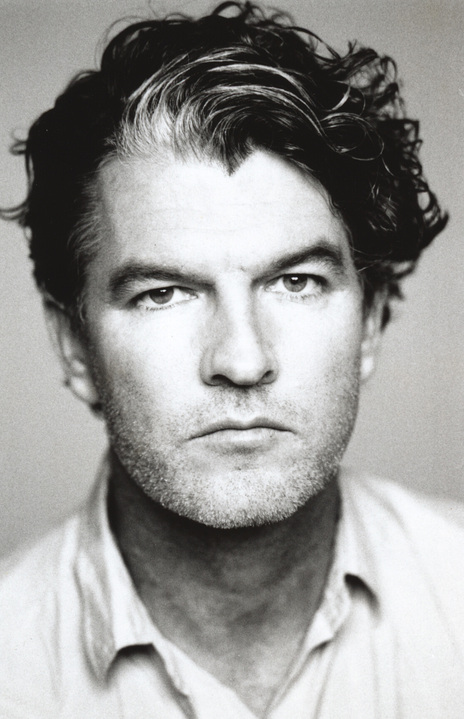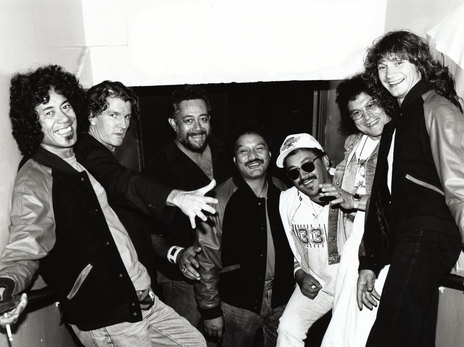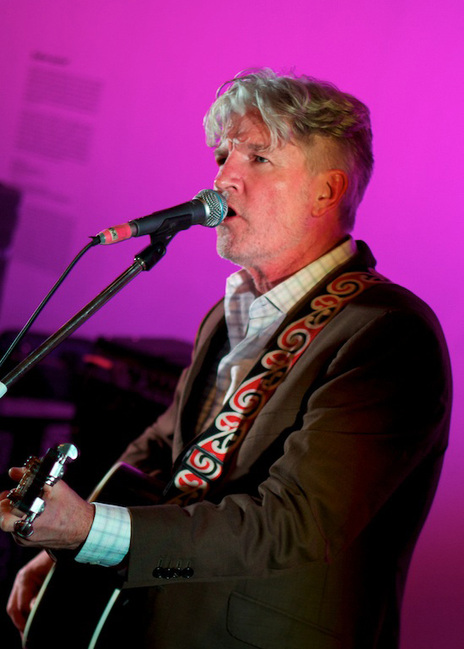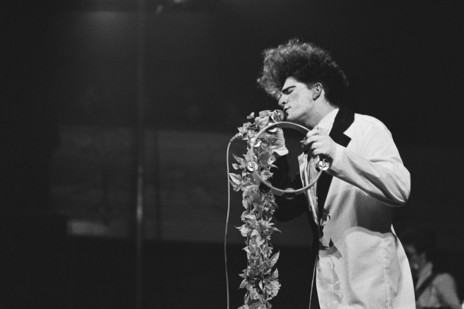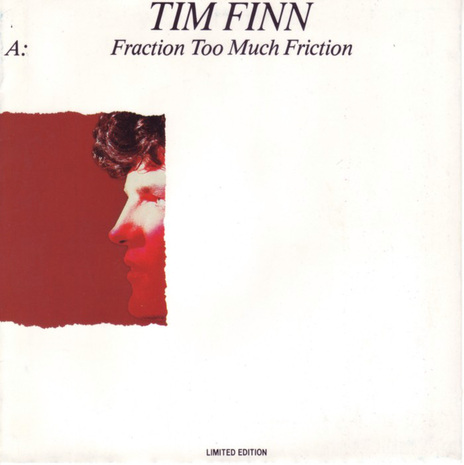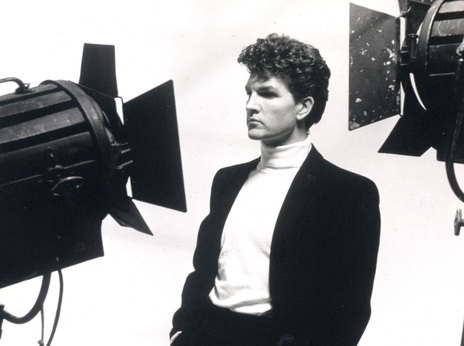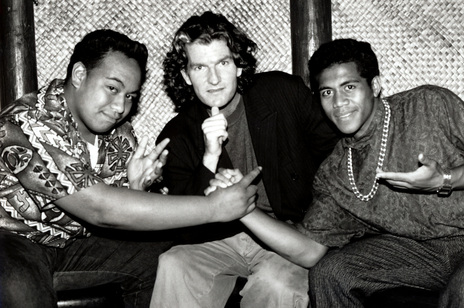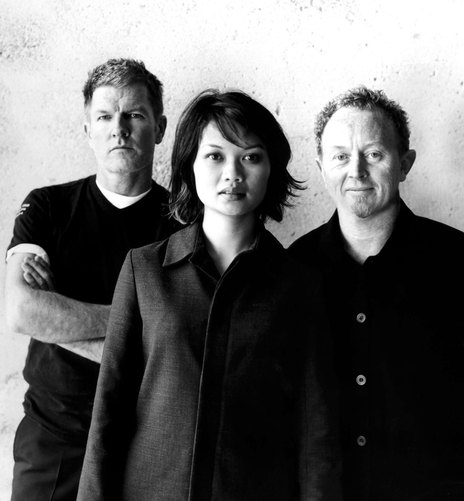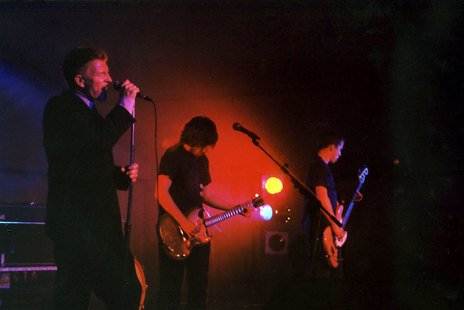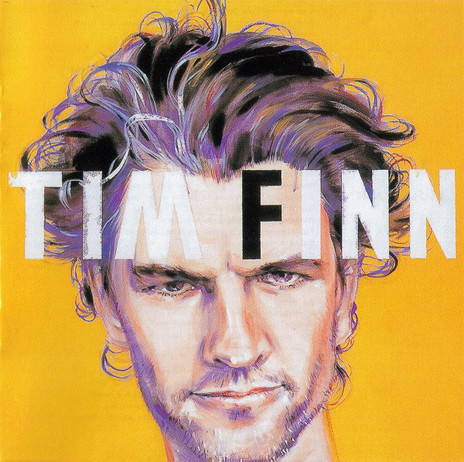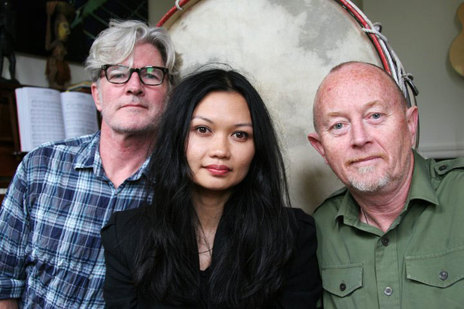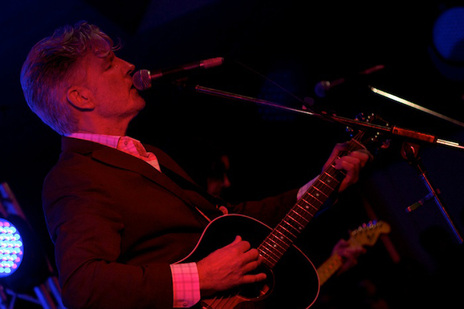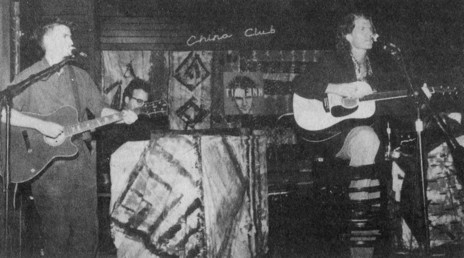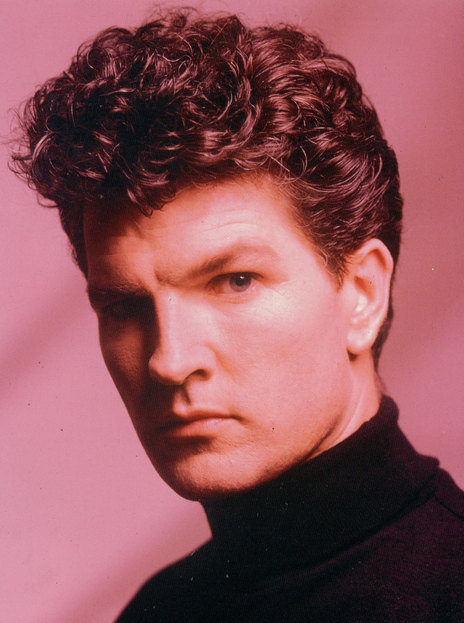It wasn't readily apparent at the time, but when Split Enz frontman Tim Finn took a break in 1983 from the band he co-founded to record his first-ever solo album, it was the beginning of the end for the group. The serious commercial success of that album, Escapade, would embolden Finn to quit the band in June 1984. Just weeks later, younger brother Neil Finn pulled the plug on Split Enz.
After coming up with arguably the group's best ever album, 1982's Time And Tide, Split Enz was a band in need of a break, both from the rigours of international touring and from each other. Feeling creatively restless, Tim Finn approached his Australian record label, Mushroom, about making a solo record. After getting the thumbs-up, he headed into a Sydney studio with co-producers Ricky Fataar (Beach Boys) and Mark Moffatt, and an A-list cast of Australian players and backing singers.
It reached No.1 in Australia and New Zealand, selling a formidable 175,000 copies after residing in the Top 20 for an astonishing seven months.
The result was Escapade, a slick-sounding record that, upon its mid-1983 release, became a major trans-Tasman hit. It reached No.1 in Australia and New Zealand, selling a formidable 175,000 copies after residing in the Top 20 for an astonishing seven months. It was propelled by first single 'Fraction Too Much Friction’, a radio and video hit in Australasia that also reached No.2 on the charts in The Netherlands.
That eclipsed the late 1983 showing of Conflicting Emotions, the final Split Enz album featuring Tim. He contributed just four songs, and the general verdict is they were far from his best.
In his Split Enz biography Stranger Than Fiction, Mike Chunn observed that by this stage "Split Enz seemed a long way from his [Tim's] thoughts ... in late October, Tim put together a band and played five shows in Sydney and Melbourne ... To full houses each night, Tim surged in the new environment, spinning out his Escapade material with the odd cover for good measure ... The critical reception matched that of the crowds; even those critics who had panned the album were smitten with Tim's performance."
Newfound confidence about his ability to cut it on his own would have been enhanced at the 1984 ARIA Awards in Melbourne. Finn was the biggest victor of the night, winning Male Performer, Songwriter, Album and Video of the Year. He also shone performing 'A Minor Key' there. Award tally for Split Enz? Zero. Tim also won the NZ Music Award for International Achievement, based on the success of Escapade.
1984 also proved a milestone year for Tim Finn personally. He was asked to write the music for and take a bit part in a feature film to be shot in Sydney. The Coca Cola Kid was to star top American actor Eric Roberts and Italian-Australian actress Greta Scacchi, with direction by Dusan Makavejev (Montenegro).
Through a breakthrough role in 1983's Heat and Dust, Scacchi was already recognised as one of the most beautiful women in film. Sparks flew when she and Finn met on set, igniting a long term relationship that had a dramatic impact on Tim. Once shooting on the film was over, Finn followed Scacchi back to summer in Europe, spending time in London and Italy, her ancestral home. Chunn describes this trip in rather over-the-top fashion: "In a hazy back street of a Tuscan village ... Tim lay between linen Italian sheets with this wonderful creature beside him."
Film work, as both a composer and to a lesser extent as an actor, occupied some of Tim's time in the 1980s. His songs (including the title track) had been featured in the 1981 Australian film Puberty Blues, and a song he wrote for Gillian Armstrong's 1982 film Starstruck, 'Body and Soul,' became a Top 5 Australian hit (sung by Jo Kennedy). That film also featured music (and a cameo appearance) by The Swingers, led by old comrade Phil Judd.
Finn wrote two songs for The Coca-Cola Kid, 'Home For My Heart and 'Coca-Cola Jingle-Strange Night’. He also wrote and sang the title song (a 1930s-sounding croon) for White Mischief (starring Scacchi), and 1988 cult favourite documentary Cane Toads: An Unnatural History. Barry Humphries (aka Dame Edna) invited Tim to compose the soundtrack for Les Patterson Saves The World, and there are reports he co-wrote a musical with NZ comedy great John Clarke (aka Fred Dagg), one that never saw the light of day.
In 1989, Finn had a part in an Italian-shot romance, La Donna della Luna (The Moon Woman). In a 1993 interview in Australian magazine HQ, he recalled the experience as "kind of embarrassing. Basically the director [Vito Zagarrio] came to London and wanted Greta so badly that he offered me a part as well. I just thought I'd do it for a laugh, so I went to Sicily and played an American airman in a film which, please God, will never be shown in this country."
Big Canoe
From his new London base, Tim Finn began work on second solo album, Big Canoe, in mid-1985. He signed with Virgin Records, and Chunn observed that "Tim had a sense that he was in the right place at the right time." Not so. "The album received some rather suspect Virgin promotion in the UK and when it failed to ignite immediately, the company sloped off," Chunn wrote.
Big Canoe traversed friendlier waters in Australasia, scoring well on the charts in Australia (No.8) and NZ (No.3). Musically more ambitious than Escapade, the album utilised a wide variety of instrumentation, including guitars, orchestral backings and traditional Indian instruments, as on the single 'No Thunder, No Fire, No Rain’, inspired by the Bhopal chemical disaster.
Tim Finn
Tim shook off any disappointment over Big Canoe's lack of Northern Hemisphere success, and by early 1988 he had a new record deal with Capitol. He recorded in Melbourne and Los Angeles with Crowded House producer Mitchell Froom for the eponymous Tim Finn. The record's Los Angeles launch party in April at a small club found Tim leading an all-star band comprising folk-rock legend Richard Thompson, Froom, Paul Hester on drums, and Alex Acuna. Oh, and one Neil Finn. Crowded House had just finished a Canadian tour, so Neil dropped in to play guitar and join Tim on a few Split Enz favourites too.
Tim then premiered some new songs in NZ, when he played a Greenpeace benefit concert at Auckland's Mt Smart Super Top (the bill also featured Stevie Ray Vaughan and Toni Childs).
The catchy single 'How'm I Gonna Sleep' was another hit, peaking at No.2.
In May 1989, the album reached No.8 on the NZ chart, eventually notching gold sales.
Despite the backing of Capitol, Tim Finn never quite clicked in North America or Australia, but NZ reaffirmed its love for its prodigal son. In May 1989, the album reached No.8 on the NZ chart, eventually notching gold sales. The catchy single 'How'm I Gonna Sleep' was another hit, peaking at No.2, while the acclaimed track 'Parihaka' was based on the history of the Taranaki Māori community known for its campaign of passive resistance to European occupiers. The song earned Tim a NZ Music Award for Best Songwriter, and he scored another as Best Male Vocalist Solo for the album.
Tim Finn's consistently unpredictable career was to take another dramatic detour in 1990. His relationship with Scacchi reportedly ended in late 1989 and Tim settled once more in Australia. He poured his energies into building a recording studio (one he christened Periscope) in the former bedroom of his Melbourne home. This wasn't some kind of lo-fi Chris Knox-style set-up, but a state-of-the-art (24-track Dolby SR system) facility.
Tim then began writing songs with brother Neil for the first time. The plan was for a Finn Brothers record, but when Neil had trouble coming up with new songs for a new Crowded House album, he took the radical step of integrating eight songs he'd written with Tim into the 1991 album that became the international hit Woodface. Even more radically, Tim joined Crowded House for a short-lived but memorable stint, one that ended on November 1, 1991 in the middle of a UK tour.
Post Crowded House, Tim refocused upon his solo career, occasionally taking time out to stroll back down memory lane with Split Enz. In December 1992, there was the 20th-anniversary gig at Auckland's Wynyard Tavern, site of their first ever gig, and this show doubled as a book launch party for Mike Chunn's Stranger Than Fiction. Around the same time, Tim and Neil played together at the Christmas party of local music video company Stratford Productions. Held in an inner city car park, the bash also featured Headless Chickens and The Exponents, surely making it NZ music's best-ever company Christmas party.
Before & After
Next up was 1993's Before & After, his fourth solo album. The record is an interesting mix of original material plus songs from the Finn Brothers project and ALT, his collaboration with Northern Irish singer/songwriter Andy White and Hothouse Flowers frontman Liam Ó Maonlaí. He again made the international press rounds, promoting the new album. His itinerary included Toronto, a city for which he has real affection, as both Split Enz and Crowded House achieved much greater success proportionately in Canada than the USA.
On October 18, he met this scribe for tea and an interview in The King Edward Hotel, Toronto's most historic grand hotel. In May of 1969, John Lennon and Yoko Ono held a press conference from their rumpled bed there, the start of the couple's North American crusade for peace. The kind of place that still serves high tea to society matrons, it's a long way from Te Awamutu. By now a man of sophisticated tastes, Tim did, of course, fit right in.
By coincidence, another New Zealander done good, Sam Neill, had just been in Toronto. On local television he gave Tim's upcoming gig at legendary Toronto venue The Horseshoe Tavern a plug, calling Finn "a genuine antipodean cultural hero."
Tim had just been over in England, and reported a positive reception there. "We've gone up a notch in England compared with a few years ago. I suppose [UK hit album] Woodface has a lot to do with that. I can play most towns in England now and draw a crowd. I sold out The Forum in London."
Finn claimed he resists the temptation to read the fickle English music press. "I don't read my own reviews, though I've been told they're quite good. I worry about that in the abstract, but I don't like reading them."
He pronounced himself content with the new album, saying "I think as an overall body of work, it is my most consistent solo record." The fact that different producers and studios were used suggest difficulties in the recording process, something Tim didn't deny. "It wasn't really smooth. There was kind of a stumbling feeling to making it. At the same time, there wasn't really a lot of pressure to finish it. The record company was quite happy to sign cheques and keep it rolling. I suspect they were hoping a miracle could happen and I'd deliver a song that was perfect Top 40 fodder. There was a method to their madness. It didn't feel like an unbearable pressure to me, though. It was 'so you want to go to Dublin for some recording? Okay ...'"
Helping cut some costs was the fact Tim had his own studio. "I could always bring tapes home, and that didn't cost the label money as we're not paying for studio time. I had wanted to make the record in six weeks, but it ended up being done in stages, over about eight months. In the end, I'm glad it happened that way. If I rush into something and do it really quickly, it usually ends up a disaster. The best things I do are when I can throw away 90 percent of what I've been doing and then get to the nitty-gritty. I think this is as close as I've ever come to doing that."
The album's high-calibre cast included Ricky Fataar, Split Enz bandmate Eddie Rayner, English guitar great Richard Thompson and members of the newly popular Irish band Hothouse Flowers. Finn told us that he especially cherished working with Hothouse Flowers.
"I met them one night at a pub in London and we just hit it off. I felt an Irish connection, even though I'd never been to Ireland. Actually, before I met them I went there very briefly, doing a show with Crowded House in Dublin. That was really wonderful, to be able to go back and do some recording. Staying with them made it even better. My connection with Dublin as a city and the Irish just became deeper and deeper."
There has always been something of the poetic Irishman about him and his persona.
The Finn's family roots go back to Ireland, and that seems significant when analysing Tim Finn. There has always been something of the poetic Irishman about him and his persona, along with a flamboyance and (at least on the outside) a brash self-confidence, character traits not generally considered typical of a New Zealander of his generation.
"I never found bitterness in Ireland," he reflected. "I know it is there. But I saw nothing but light and grace and poetry, so I guess I was a classic first-timer there. I thought for a while I'd go live there, but I think I'd rather have it as a place to visit."
The seeds of future project ALT were sown during the making of the record. "I wrote a song with Liam (Liam Ó Maonlaí, Hothouse Flowers singer) and (Irish singer-songwriter) Andy White," Tim explained. "There was a melody I had and they helped cobble it together and finish it off." Two co-writes with Neil Finn made it onto the record, all from the same sessions that sparked Woodface.
Before & After was the recipient of much critical praise. Alister Cain in Rip It Up August 1993 called it "a wonderfully varied album with Finn in fine form both lyrically and musically, then there's that unmistakable voice. Look, we all knew that one day Tim Finn would make a killer album that is right up there. This, folks, is it."
It was far from a big commercial success, though it did reach No.3 on the NZ charts. Intriguingly, it fared better in the UK (peaking at No.29) than Australia (No.34). The record's second single, 'Persuasion’, reached No.6 in NZ, but a feeble No.62 in Australia, while other singles 'Hit The Ground Running' and 'Many's The Time' had minimal impact.
In June 1993 both Tim and Neil Finn received the OBE for services to New Zealand music.
In June 1993 both Tim and Neil Finn received the OBE for services to New Zealand music in the Queen's Birthday Honours List. By coincidence, both brothers were in the UK then. Tim was promoting Before & After, while Neil was working on the sequencing of the upcoming Crowded House album. The brothers celebrated the news with Neil joining Tim onstage for a brief acoustic set at London showcase club The Borderline.
In the summer of early 1995, Tim Finn found himself back in the NZ singles chart, a mite unconventionally. He wrote the song 'Runs In The Family' on commission to celebrate the centenary of New Zealand cricket. Thanks in part to a cute video mixing family and test match footage, the song reached No.9 on the NZ singles chart, but the song won't go down as a Finn classic.
And then there were two
Given the success of the pleasurable songwriting partnership Tim and Neil had forged in the Woodface era, it was no great surprise they decided to again work on a duo project. The result was The Finn Brothers and 1995 album Finn. This was a duo record in the true sense. Tim and Neil played all the instruments, aside from mate Dave Dobbyn on bass on 'Kiss The Road Of Rarotonga’. The pair co-produced, along with Tchad Blake, recording at Auckland's York Street Recording Studios in a reportedly stress-free manner.
In an interview with Australian journalist Kathy McCabe, Tim described the joint songwriting process as "a very easy, joyful time. There was sweat but no real angst. Who did what varies from song to song. One of us would have a musical idea, the other would bring a lyric, and then we'd both finish it. We swap roles all the time." In retrospect, you can't help but wonder how Split Enz might have evolved if Tim and Neil had actually tried writing songs for the band that way.
Finn was released in Australasia and Europe in October 1995, through Parlophone/EMI. The month before, both Finns promoted it in the UK, dropping in on an EMI sales conference to prime the pump. Mojo's David Hepworth called the album "admirably organic, warm and loose." His prediction that it lacked wide commercial appeal was to be fulfilled. It made its UK chart debut at No.15, but quickly fell out of view, with the two singles, 'Suffer Never' and 'Angels Heap', having neglible impact.
In Australasia, Finn received mixed reviews and never cracked the Top 10. Material from the album nestled alongside Split Enz and Crowded House favourites when the brothers toured Australia and NZ in early 1996, billed as 20 Years Of Song-An Evening With Neil And Tim. A theatre tour of six New Zealand cities was very well received. Finn didn't score a USA release until July 1996, on Warner offshoot Discovery. The brothers promoted it with an eight-city North American tour, and attendant press activity, in July. This included a return visit to Toronto on July 6, just two weeks after Crowded House's Northern Hemisphere swansong gig at The Horseshoe in Toronto.
Tim delivered the biggest surprise of the set, sitting at the piano and delivering a passionate version of Mental Notes era Enz classic 'Time For A Change’, one he dedicated to Phil Judd.
Perhaps feeling unburdened after his decision to shut Crowded House down, Neil was in relaxed and upbeat mode here, as was Tim (this scribe was in attendance). Tim delivered the biggest surprise of the set, sitting at the piano and delivering a passionate version of Mental Notes era Enz classic 'Time For A Change’, one he dedicated to Phil Judd. Other Split Enz and Crowded House classics were reprised, though tellingly Neil never mentioned that latter band's name. Hearing those sublime sibling harmonies once more was the highlight of the gig.
The North American tour closed out with two sold out nights at LA’s John Anson Ford Theatre (capacity 1,100). That was something to crow about, with both Russell Crowe and Sheryl Crow in attendance (as was Jamie Lee Curtis). The Finn album may have been a commercial stiff there, but the brothers still had some big name fans.
It was during this period that Tim Finn's short-lived side project, ALT, took flight. The trio, formed in 1994 with folk troubadour Andy White and Hothouse Flowers' Liam Ó Maonlaí, named themselves from the initial letters of their first names. They recorded one studio album, Altitude, at Periscope in Melbourne, followed by live recording Bootleg, taken from a performance at The Continental in Sydney. ALT toured Australasia and had a short European tour around the release of Altitude, though the disc didn't achieve much chart altitude, peaking at No.67 in the UK.
Say It Is So
Tim Finn acknowledged his subsequent absence from the scene in the liner notes to his next solo album, 2000’s Say It Is So. "To all those who have even idly wondered what I was up to during these last several years, thank you for your thought waves," he wrote. He was no longer in demand by major labels, and Say It Is So was distributed by small independent Colorado-based label What Are Records?
The disc deserved better promotion and exposure. The well-crafted and vigorous album was recorded in Nashville with producer and multi-instrumentalist Jay Joyce. Notable guests featured included Wilco drummer Ken Coomer and backing singer Julie Miller. Four of the songs are credited as co-writes by Tim and his wife Marie Azcona, then an Australian TV presenter (MTV and TVNZ's Music Week).
The thought of Tim recording in Music City producing mostly new country schlock may seem surprising, but he found a credible kindred spirit in Jay Joyce. Formerly in the bands In Pursuit and Bedlam, the Grammy-winning Joyce has gone on to produce such artists as The Wallflowers, Keith Urban, and Emmylou Harris. Finn toured sparingly through the USA, one highlight coming when June 5, 2000 was proclaimed “Tim Finn Day” by the Mayor of Pittsburgh.
2000 also saw the release of album Together in Concert: Live, featuring Tim and fellow top NZ singer-songwriters Bic Runga and Dave Dobbyn. Recorded in August and September in venues around New Zealand, the album saw the three performers each equitably showcased, all providing vocal and instrumental backing on each other's songs. The album spent 16 weeks in the New Zealand charts, and received a belated UK release in 2007.
Feeding The Gods
This 2001 solo album was notable for the inclusion of 'Incognito In California’, a song Phil Judd had reportedly written during a stint in the English countryside back in 1977. The album also included Tim's fresh take on a song from Altitude, 'What You’ve Done’. It reached No.27 on the NZ charts.
Tim Finn's status in this period was summed up at the time by NZ writer Gary Steel: "In New Zealand, Tim Finn can bask in the glory of being an elder statesman of Kiwi pop. He can raise a child in a country that is still comparatively safe and easy to negotiate. He can enjoy Enz reunions and embark on ridiculously successful tours like the Finn/Runga/Dobbyn spectacular ... There’s all that, but it’s easy to forget that Finn’s career lacks the comfort factor of guaranteed international distribution and touring support that would seem a given for an artist of his standing."
Everyone Is Here
Tim's next recording project certainly had a higher profile than his under the radar solo efforts. In 2004, he reunited with Neil for the second Finn brothers album, Everyone Is Here. The album was originally slated to be produced by Tony Visconti, and recording sessions took place in upstate New York. Unsatisfied with the results, the Finns returned to the familiar terrain of Mitchell Froom and Bob Clearmountain, working on a new version of the album in Los Angeles six months later. In his August 20 review The Age critic Michael Dwyer claimed "the family reunion comes at the expense of new musical ground," and interest in what famed Bowie producer had come up with The Finns remains high. Some of the songs from the Visconti session were kept as B-sides and later appeared on a 2005 special edition of the album.
In 2005, The Finn Brothers won the NZ Music Award for International Achievement Award for Everyone Is Here.
International press response was generally and deservedly more positive than for Finn. AllMusic.com rated in four and a half stars (of five). That site's reviewer, Stephen Thomas Erlewine, called it "the Finn Brothers' strongest collection of songs since Woodface, and arguably their most emotionally resonant album to date ... It's a meditative, expertly crafted mature pop record, filled with subtle sonic textures – ranging from banjos to harmoniums, all adding colors to layers of primarily acoustic guitars – that give this low-key, reflective music a rich variety of color ... At its heart, this is an album about family – specifically, about being brothers."
In 2005, The Finn Brothers won the NZ Music Award for International Achievement Award for Everyone Is Here. Both the album and the single 'Won't Give In' were also nominated for Awards. 'Won't Give In' was featured on the soundtrack to the film Because of Winn-Dixie.
A more successful placement of a song on a film soundtrack came when Tim's composition 'Winter Light' appeared on the soundtrack of 2005 hit The Chronicles of Narnia: The Lion, the Witch and the Wardrobe. Songs by Alanis Morissette and Imogen Heap were also included, but Amazon.com noted "the best of these songs is 'Winter Light' by Tim Finn, four minutes of understated, piano-driven melancholia."
Imaginary Kingdom
'Winter Light' was reprised on Tim's next solo album, 2006's Imaginary Kingdom. Finn returned to Nashville to make that record, this time recruiting LeAnn Rimes' producer Bobby Huff for the project. The well-received disc helped Tim win yet another NZ Music Award in 2007, this time as Best Male Solo Artist. Once again, it barely scratched the charts (No.48 in Australia, No.18 in NZ)
The Conversation
Next up in Tim's now large solo discography was 2008's The Conversation. Produced by Ethan Allen (Daniel Lanois), it features collaborations with guitarist Brett Adams and former Split Enz members Eddie Rayner and Miles Golding.
Tim told USA website Laist that "It's a four piece acoustic album which is an album I've been wanting to make for a long time. It's kind of like chamber pop. I wanted the four of us to sit around and play music together and see what happens. It's a quiet record, but it's got its dynamics and was very inspirational to make."
In his four-star review, NZ Herald critic Russell Baillie wrote "With its retro-connections this eighth Finn solo effort offers much to discuss. Fortunately those talking points don't drown out The Conversation and its many listening pleasures." Not a conversation that reached many ears, though. In fact, no chart placing was ever registered.
North, South, East, West ... Anthology
The compilation did serve as a reminder of just how formidable a body of work Tim Finn had compiled.
This 2009 career retrospective is billed as Tim Finn's first solo compilation. That's a mite misleading, given that the two-CD collection includes Split Enz classics, reworked versions of Crowded House songs (with Liam Finn and Bic Runga), Finn Brothers and ALT songs, alongside solo Tim hits, a collaboration with Oz star Missy Higgins (on Enz track 'Stuff & Nonsense'), and a couple of obligatory new songs. The compilation did serve as a reminder of just how formidable a body of work Tim Finn had compiled over the previous 35 years.
The idea for the collection came from EMI Australia head, John O'Donnell. Tim told Stuff.co.nz's Simon Sweetman that "I only realised after the title was chosen that there are four parts to my career: the Enz work and Crowded House, the Finn Brothers material and of course my solo work … the musical north, south, east and west."
The fact that the album only stayed on the NZ charts for two weeks, peaking at No.15, showed that Tim's commercial star had rather dimmed. Even that was a better result than the disappointing numbers for his previous few solo efforts.
One interesting creative detour in 2009 came with Poor Boy, a stage play written by Matt Cameron around Finn songs. It scored good reviews when it premiered in Melbourne with a cast including Oz star Guy Pearce. Poor Boy premiered in NZ in March 2011, at Auckland's Maidment Theatre. The impressive cast included Jennifer Ward-Leland, Rima Te Wiata, and Sophia Hawthorne.
The View Is Worth The Climb
At one stage, Tim Finn reportedly envisaged The Conversation as the end of his career as a solo recording artist. He told Russell Baillie that compiling his anthology "was like a little pause and I genuinely thought I wouldn't do a solo album again."
the resulting 2011 album, The View Is Worth The Climb, has been one of his best-received solo albums.
The creative itch returned, though, and the resulting 2011 album, The View Is Worth The Climb, has been one of his best-received solo albums. He made it at brother Neil's Roundhead Studios, abetted by such top players as Joey Waronker, Zac Rae and frequent sideman Brett Adams. The title track was co-written with leading Australian singer-songwriter Megan Washington. In the producer’s chair this time was Grammy- winning American producer/mixer Jacquire King (Kings Of Leon, Tom Waits, Modest Mouse).
Describing the album on his website, Tim noted that “I worked on the songs for a long time ... Then it was a matter of the pure excitement of playing them with great musicians and only having two weeks and capturing all that: some of the vocals are live with very little overdubbing. I think that’s partly why it sounds so fresh.”
NZ Herald critic Russell Baillie termed it "among his strongest solo albums," conferring a 4.5 (out of 5) star rating in the September 8, 2011 issue. "The View Is Worth The Climb neatly ties the autobiographical to the universal throughout, making it a terrific album to please the Finn-atic and casual follower alike," Baillie concluded. The pattern of diminishing sales returns continued, however. The album barely crawled into the NZ Top 30 (No.28).
A memorable Finn Brothers performance came in September 2011, when they headlined the opening concert for the Rugby World Cup in Auckland.
There have been no new Tim Finn solo albums since The View, but Tim has not been creatively idle. Being a father to his two young children with wife Marie Azcona, son Harper and daughter Elliot, has taken up much of his time over the past 15 years, and many a feature story in the Australasian press depicted Tim's open-hearted embrace of parenthood and family life.
Tim moved his family from Australia to Auckland in 1999. He explained to Australian online publication Suite 101.com in 2011 that "although I came regularly for tours and to visit family, I was basically living outside New Zealand for 25 years. We had our first child 13 years ago and came back here to live. My wife’s from Australia and our son was born there, but it just seemed like a good time to come home."
Tim still sporadically performs in Australia and New Zealand, especially at festivals, and he has worked on theatre and film projects. In 2012, he composed the score for the film version of acclaimed NZ novel Mister Pip. Also in 2012, he collaborated with New Zealand artist Ken Duncum on stage production, White Cloud, presented at Wellington's BATS Theatre. The press release description was: "New songs written by Tim Finn weave together with stories and observations brought to life by actors to create an immersive music and spoken word experience." It explored themes of New Zealand culture and identity, subjects that have oft appeared in Tim Finn's body of work.
His return to live in NZ has fuelled those explorations. “I want to go deeper,” he told Gary Steel in 2002. “By playing in Whanganui and Kaikohe and places like that, I can go much further into New Zealand than I’ve ever been."
Now in his early 60s, Finn has, over 40 years of artistic endeavour, become a crucial component of our cultural identity. An eloquent ambassador for New Zealand music, he has displayed creative and personal courage, as in his frank comments about mental health issues he has faced. That promiscuously employed tag of "icon" does apply here.
